
A potato chip or crisp is a thin slice of potato that has been deep fried, baked, or air fried until crunchy. They are commonly served as a snack, side dish, or appetizer. The basic chips are cooked and salted; additional varieties are manufactured using various flavorings and ingredients including herbs, spices, cheeses, other natural flavors, artificial flavors, and additives.

Biltong is a form of dried, cured meat which originated in Southern African countries. Various types of meat are used to produce it, ranging from beef to game meats such as ostrich or kudu. The cut may also vary being either fillets of meat cut into strips following the grain of the muscle, or flat pieces sliced across the grain. It is related to beef jerky; both are spiced, dried meats; however the typical ingredients, taste, and production processes may differ.
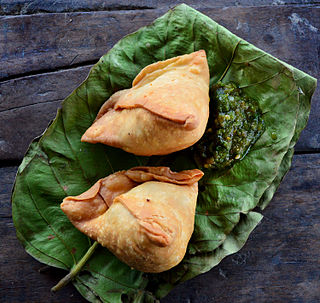
A samosa is a fried South Asian pastry with a savoury filling, mostly vegetables, spiced potatoes, onions, peas, also non-vegetarian meat, or fish. It is made into different shapes, including triangular, cone, or crescent, depending on the region. Samosas are often accompanied by chutney, and have origins in medieval times or earlier. Sweet versions are also made. Samosas are a popular entrée, appetizer, or snack in the cuisines of South Asia, the Middle East, Central Asia, East Africa and their South Asian diasporas.
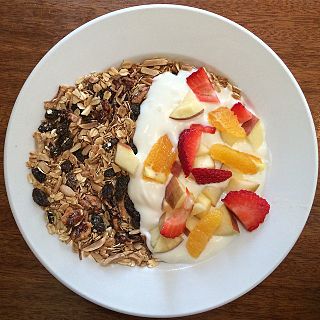
Granola is a food consisting of rolled oats, nuts, seeds, honey or other sweeteners such as brown sugar, and sometimes puffed rice, that is usually baked until crisp, toasted and golden brown. The mixture is stirred while baking to avoid burning and to maintain a loose breakfast cereal consistency. Dried fruit, such as raisins and dates, and confections such as chocolate are sometimes added. Granola is often eaten in combination with yogurt, honey, fresh fruit, milk or other forms of cereal. It also serves as a topping for various pastries, desserts or ice cream. Muesli is similar to granola, except that it is traditionally neither sweetened nor baked.

Rice Krispies is a breakfast cereal produced by WK Kellogg Co for the United States, Canadian, and Caribbean markets and by Kellanova for the rest of the world. Rice Krispies are made of crisped rice. When milk is added to the cereal the rice tends to collapse, creating the characteristic "snap, crackle and pop" sounds.
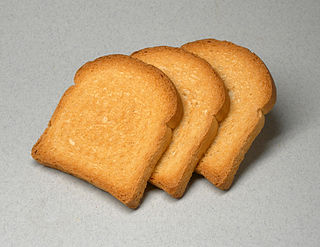
A rusk is a hard, dry biscuit or a twice-baked bread. It is sometimes used as a teether for babies. In some cultures, rusk is made of cake, rather than bread: this is sometimes referred to as cake rusk. In the UK, the name also refers to a wheat-based food additive.

PepsiCo, Inc. is an American multinational food, snack, and beverage corporation headquartered in Harrison, New York, in the hamlet of Purchase. PepsiCo's business encompasses all aspects of the food and beverage market. It oversees the manufacturing, distribution, and marketing of its products. PepsiCo was formed in 1965 with the merger of the Pepsi-Cola Company and Frito-Lay, Inc., PepsiCo has since expanded from its namesake product Pepsi Cola to an immensely diversified range of food and beverage brands. The largest and most recent acquisition was Pioneer Foods in 2020 for US$1.7 billion and prior to it was buying the Quaker Oats Company in 2001, which added the Gatorade brand to the Pepsi portfolio and Tropicana Products in 1998.
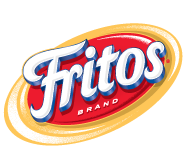
Fritos is an American brand of corn chips and dipping sauces that was created in 1932 by Charles Elmer Doolin and has been produced since 1961 by the Frito-Lay division of PepsiCo. Fritos are made by deep-frying extruded whole cornmeal, unlike the similar tortilla chips, which are made from cornmeal and use the nixtamalization process. It is one of two brands representing Frito-Lay along with Lay's.

South African cuisine reflects the diverse range of culinary traditions embodied by the various communities that inhabit the country. Among the indigenous peoples of South Africa, the Khoisan foraged over 300 species of edible food plants, such as the rooibos shrub legume, whose culinary value continues to exert a salient influence on South African cuisine. Subsequent encounters with Bantu pastoralists facilitated the emergence of cultivated crops and domestic cattle, which supplemented traditional Khoisan techniques of meat preservation. In addition, Bantu-speaking communities forged an extensive repertoire of culinary ingredients and dishes, many of which are still consumed today in traditional settlements and urban entrepôts alike.

Hellmann's and Best Foods are American brand names that are used for the same line of mayonnaise, ketchup, mustard, sauce, salad dressing, condiments and other food products. They have been owned by the British multinational company Unilever since 2000. The Hellmann's brand is sold in the United States east of the Rocky Mountains; Latin America; Europe; Australia; the Middle East; Canada; India; and Pakistan. The Best Foods brand is sold in the United States west of the Rocky Mountains; in East Asia; Southeast Asia; Australia, and New Zealand.

The Smith's Snackfood Company is a British-Australian snack food brand owned by the American multinational food, snack, and beverage corporation PepsiCo. It is best known for its brand of potato crisps. The company was founded by Frank Smith and Jim Viney in the United Kingdom in 1920 as Smiths Potato Crisps Ltd, originally packaging a twist of salt with its crisps in greaseproof paper bags which were sold around London. The dominant brand in the UK until the 1960s when Golden Wonder took over with Cheese & Onion, Smith's countered by creating Salt & Vinegar flavour which was launched nationally in 1967.
Simba is a fictional character who appears in Disney's The Lion King franchise.

Ouma ( is a South African rusk made from a traditional buttermilk recipe. It was first produced in the rural town of Molteno, in the Eastern Cape, by Elizabeth Ann Greyvenstyn in 1939, in response to an initiative by the town's pastor to help the entrepreneurial efforts of the women in his congregation. The brand currently dominates the relatively-small local rusk market, and is manufactured in the same town it was first produced.

Chicken Licken is a South African fast-food fried chicken restaurant chain. The company had a 5% share of South Africa's fast food market in 2010, tying with McDonald's. According to a case study published by the Henny Penny Corporation in 2011, Chicken Licken is the "largest non-American-owned fried chicken franchise in the world".[

Simba Chips is a popular South African brand of potato crisps. It was first introduced in 1957 by the Greyvensteyn family. "Simba" is the Swahili word for "lion" and the product's mascot is an adult male African Lion.
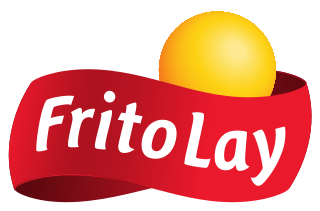
Frito-Lay, Inc. is an American subsidiary of PepsiCo that manufactures, markets, and sells corn chips, potato chips, and other snack foods. The primary snack food brands produced under the Frito-Lay name include Fritos corn chips, Cheetos cheese-flavored snacks, Doritos and Tostitos tortilla chips, Lay's and Ruffles potato chips, Rold Gold pretzels, and Walkers potato crisps. Each brand generated annual worldwide sales over $1 billion in 2009.
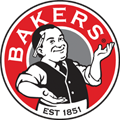
Bakers Limited, commonly known as Bakers, is a South African company which produces a wide variety of savoury and sweet biscuits.
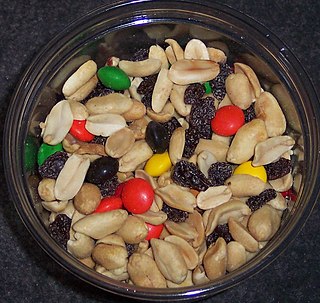
A snack is a small portion of food generally eaten between meals. A snack is often less than 200 calories, but this can vary. Snacks come in a variety of forms including packaged snack foods and other processed foods, as well as items made from fresh ingredients at home.

NikNaks, also known as "amaNikNaks," is the brand name for a popular brand of South African Cheese puffs manufactured by the Simba Chips company since 1972. Originally only coming in a "Cheese" flavour. It is normally sold in 55 gram and 135 gram bags, and is primarily made from maize, vegetable oil, salt and cheese.


















